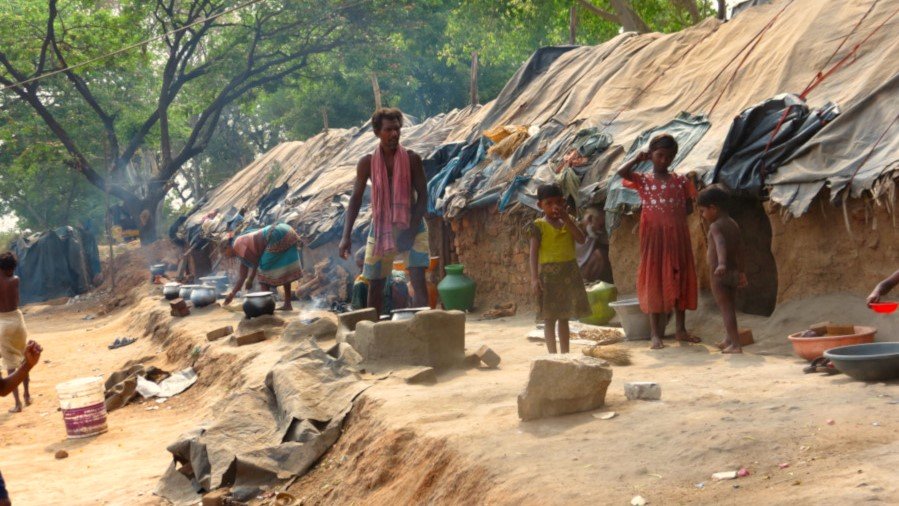 Prime Minister Narendra Modi announced free ration for 800 million Indians for the coming 5-month period “to empower the poor, downtrodden and deprived sections of society”, New Delhi, June 30, 2020
Prime Minister Narendra Modi announced free ration for 800 million Indians for the coming 5-month period “to empower the poor, downtrodden and deprived sections of society”, New Delhi, June 30, 2020
Prime Minister Narendra Modi’s address to the nation today evening has been a remarkable event from several perspectives. For a start, he dedicated his speech almost entirely to the concerns of the masses. His target audience was 800 million Indians in a population of 1.35 billion.
Modi spoke about what the government proposes to do to make sure that these 800 million people have food to eat. He announced that the free ration to the needy which is in vogue will be further extended upto end-November. In effect, this is a pledge that government will guarantee that every member of the family will get free of cost 5 kilogram of wheat or rice and one kilogram of lentils per month through the coming five-month period.
The timeline given in the speech also contains an unmistakeable signal that in the government’s estimation, the Covid-19 pandemic is not expected to go away at least for another five months.
The bottom line is that Modi has made it abundantly clear that the national priority of the government today is to “empower the poor, downtrodden and deprived sections of society” — to borrow his words — through a most difficult period of economic dislocation aggravated greatly due to the pandemic. Importantly, Modi related this to plans to “further expand the Economic Activities.”
The second big commitment that Modi made was about the implementation of the One Nation, One Ration card scheme. As he put it, “Major beneficiaries of this will be those who to other states in search of employment.” In every sense it is an act of atonement for the tragedy of the migrant workers that the nation witnessed in disbelief and shame in the recent past. The scheme holds the historic potential to address the problem of destitution in the country.
Such an all-consuming prioritisation of the amelioration of poverty will carry resonance not only in the domestic politics and political economy but also regionally and internationally. There was much speculation in the air in the run-up to Modi’s speech that he might be making some ‘big statements’ in regard of the tensions on the India-China border. But in the event, Modi did not allow himself to be distracted from the most important item in his calculus — India’s tryst with economic recovery. This is highly significant.
Look at the paradigm this way. At a time when India’s main opposition party, Congress, is obsessed with the India-China tensions, Modi has turned his back on them and is walking away in an entirely different direction and brings to the centre stage the problem of poverty in our country and the subsistence level existence of a majority of Indians. The Congress Party leadership looks rather elitist and hopelessly out of touch with Indian realities not to comprehend the real concerns of the masses at a time like this.
Look at it another way. Suffice to say that it is a reasonable surmise after watching Modi’s 16-minute speech today that his government is not contemplating a war with China. Put differently, Modi is not going to be be hustled into a war in the way in which Nehru was in the late fifties and early sixties in almost identical circumstances at the hands of the very same reactionary right-wing forces and their mentors abroad that ultimately landed the country in a catastrophic war with China in 1962. Personally speaking, I heaved a sigh of relief to see such statesmanship.
Now, look at it yet another way. Frankly, Modi’s real problem today on the China front is the paucity of informed public opinion in our country. No government before him had done anything by way of educating the public with candour about the complexity of India’s border dispute with China, which engenders situations on the border such as at present and has made the negotiation of a permanent border settlement almost impossible today.
People at large, including, sadly enough, erudite minds, do not even realise or care to remind themselves that this dispute is quintessentially about creating a border where none previously existed in the pre-independent era through vast swathes of our country’s tumultuous history — or that in order to negotiate a mutually acceptable border that safeguards the core interests of both India and China, a lot of give and take becomes necessary. Meanwhile, the binary nature of our national politics and the surge of ‘nationalism’ in the recent years in the country has added to the stalemate.
This is where the timing of Modi’s address today will be noted regionally and internationally, including in China. By turning his face to focus on the burning issues of poverty as his principal preoccupation today, Modi has put in perspective the core of the national agenda in the near term.
The heart of the matter is that the fight against the pandemic and the resumption of economic activity are inter-related. Modi’s speech flagged this linkage. Now, economic recovery is not possible in a void without providing the necessary social underpinnings. Admittedly, in its sheer scale, this becomes a gargantuan challenge.
Most certainly, the country cannot afford to take the risk of a reckless China policy. One false step at this crucial juncture, and India will land in the same hopeless mess in which the United States finds itself today with a virus spread that can no longer be controlled and with a bleak economic future amidst great societal disarray and drift. Indeed, Modi’s speech signifies that a steady hand is holding the steering wheel. It raises the nation’s comfort level at a time of uncertainties.
